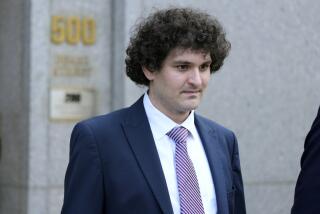Fat and happy justice
- Share via
THE CHORUS OF “I TOLD YOU SO’s” must have been deafening last week when a federal appeals court reversed the obstruction-of-justice conviction of former dot-com investment banker Frank Quattrone. After all, when the U.S. Supreme Court unanimously overturned former accounting powerhouse Arthur Andersen’s Enron-related conviction last year, Quattrone’s legal team was among the first to pipe up. They argued that their client -- who, like Andersen and Enron, had come to personify late-’90s business excess -- deserved a break too.
No one knows yet whether Quattrone will be tried again. But the larger issue is what this decision may mean for the ongoing Enron trial in Houston and, more generally, for the 21st century campaign against corporate abuse.
For the record:
12:00 a.m. March 30, 2006 For The Record
Los Angeles Times Thursday March 30, 2006 Home Edition California Part B Page 12 Editorial Pages Desk 1 inches; 49 words Type of Material: Correction
Corporate justice: According to an editorial Tuesday, the federal appeals court that reversed the conviction of former investment banker Frank Quattrone for obstruction of justice said the government would have won its case on the evidence. The court said only that “the evidence is sufficient to support Quattrone’s conviction.”
In both the Andersen and Quattrone cases, executives urged employees to destroy documents in compliance with established (though loosely enforced) company policy, just before planned government investigations. And in both cases, courts found that trial judges flubbed jury instructions, failing to make clear that to reach a guilty verdict, prosecutors had to prove intent to commit a crime.
It’s tempting to write off “bad jury instructions” as a technicality. But these are real prosecutorial failures as well. In the Quattrone case, they were made all the more regrettable by the fact that even the court that reversed his conviction said the government would have won its case on the evidence. Overwrought prosecutors, whether trying terrorists or chief financial officers, sometimes do a lousy job dotting the i’s and making sure attorneys prepare witnesses appropriately.
There is a silver lining for the Enron trial: Lawyers in Houston almost certainly will pay closer attention to the jury instruction phase and other “technicalities” as the trial proceeds.
The bigger picture -- the fate of corporate reform generally -- is cloudy. Fat and happy, and mollified by Sarbanes-Oxley protections, investors and the public at large may not care as much whether operators like Quattrone get their due. Part of the reason may be that real estate wealth has replaced dot-com paper fortunes. But there are other factors.
Old-school reformer William H. Donaldson is out at the Securities and Exchange Commission; new-age technocrat Christopher Cox is in. New York Atty. Gen. Eliot Spitzer is running for governor of that state. The Dow is closing in on its all-time high; venture capitalists are once again showering money on Internet companies.
Everyone, it seems, has moved on. But that doesn’t mean the bad guys should get to too.
More to Read
Inside the business of entertainment
The Wide Shot brings you news, analysis and insights on everything from streaming wars to production — and what it all means for the future.
You may occasionally receive promotional content from the Los Angeles Times.










